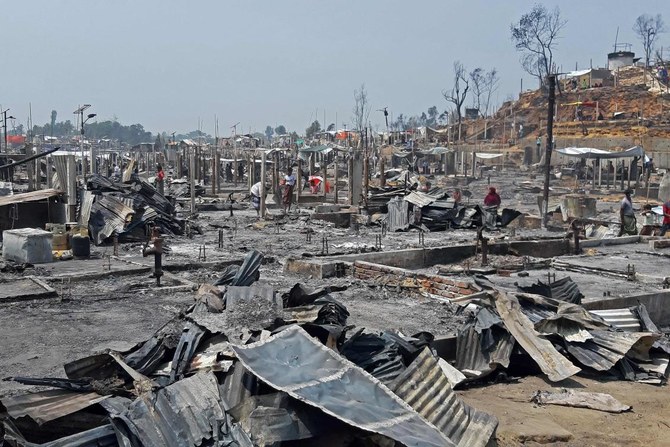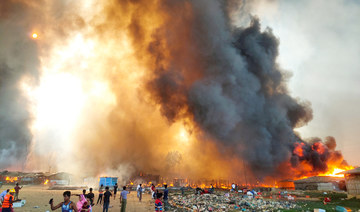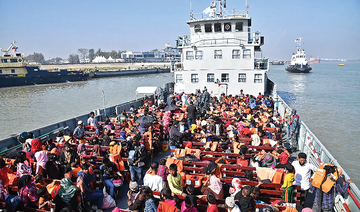DHAKA: At least 15 Rohingya refugees were reported dead on Tuesday after a massive fire ripped through several camps in Bangladesh’s Cox’s Bazar district overnight, forcing at least 50,000 people to flee, an official from the UN High Commissioner for Refugees (UNHCR) said.
“It has been confirmed that 15 people have tragically lost their lives, and around 560 are injured; 400 are still missing,” Louise Donovan, UNHCR spokesperson at Cox’s Bazar, told Arab News.
Donovan added that the UN refugee agency is in the process of assessing the losses and “expects the death toll to increase.”
Bangladeshi officials said Monday’s fire started in Balukhali camp 8 — one of the 34 camps which span about 3,237 hectares of land — before spreading to three other camps.
“More than 9,000 houses were gutted in the fire which made more than 50,000 refugees homeless,” Nizam Uddin Ahmed, a senior government official in the Ukhia subdistrict where most of the refugee camps at Cox’s Bazar are located, told Arab News.
“Besides the houses, a community bazaar, some NGO camp offices, a mosque, religious teaching schools, and some relief supply chain centers were also burnt down,” he added.
Thick plumes of smoke could be seen filling the night sky in several videos shared on social media as hundreds of rescue workers battled the flames to pull the Rohingya back to safety.
According to Refugees International, a humanitarian organization, many children were missing and “some were unable to flee because of barbed wire set up in the camps.”
Officials are yet to determine the cause of the incident, with Ahmed saying that authorities had launched a probe into the matter.
“We have formed an enquiry committee to ascertain the reason for the fire. Hope we will know the details once the report is submitted,” he said.
Meanwhile, some of the victims sought temporary shelter with their relatives at nearby camps, while others were moved to makeshift facilities by the authorities.
“We have a sufficient number of tents in stock at this moment to arrange a temporary shelter for them,” Ahmed told Arab News, adding that the authorities had also “started distributing cooked meals to the Rohingya” from Tuesday.
“Some 60,000 packed food boxes were distributed for lunch, and we will continue this process as long as it requires,” Ahmed said.
Two similar blazes hit Rohingya refugee camps in January, leaving thousands homeless and gutting four UNICEF schools.
But witnesses who spoke to Arab News on Tuesday described the latest fire incident as “horrible and frightening.”
Ro Yassin Abdumonab, a Rohingya youth, said: “Initially, the refugees and camp volunteers tried to douse the fire, but in vain due to the strong winds. Later on, firemen joined us, and it took several hours for them to control the fire.”
Abdul Khalek, a 38-year-old refugee from the Balukhali camp, said the fire had “engulfed” the entire area before they could act.
“I was at home with my family when we heard a loud noise in the camp area, and people started shouting for help,” Khalek told Arab News, adding: “I couldn’t see anything due to heavy smoke outside. Instantly, I escaped the scene along with my children and wife. I couldn’t save any of my belongings.”
Bibi Hajera, 33, another refugee from the Balukhali camp, said she “had no idea how a fire could be so devastating and out of control within hours.”
Hajera, a mother of two, told Arab News: “It was like hell as everyone was fleeing from the scene to save lives. I heard children crying for help while running for a safer place.
“Everything is lost once again. I don’t know when we can manage the family belongings like beds, clothes and utensils for our living.”
The fire incident comes nearly a week after a UN team completed its first visit to a remote island built by Bangladesh. Dhaka has relocated nearly 14,000 Rohingya Muslim refugees there since December despite criticism from rights groups.
The three-day visit to Bhasan Char, dubbed Rohingya island, began on March 17 with UN experts traveling by boat from Chottogram.
Located in the Bay of Bengal, 60 km from the mainland, Bhasan Char was built by Bangladesh in 2006 using Himalayan silt, at the cost of more than $360 million, to ease the overcrowded camps in Cox’s Bazar.
Bangladesh is hosting more than 1.1 million Rohingya Muslims who fled persecution at the hands of the Myanmar military in the Buddhist-majority country.
The Rohingya endured decades of abuse in Myanmar, beginning in the 1970s when hundreds of thousands sought refuge in Bangladesh.
Between 1989 and 1991, an additional 250,000 fled when a military crackdown followed a popular uprising and Burma was renamed Myanmar.
In 1992, Bangladesh and Myanmar agreed to a repatriation deal which led to thousands of Rohingya returning to Rakhine state.
The latest Rohingya exodus to Bangladesh resumed in August 2017 following a military crackdown on the ethnic minority group.


























